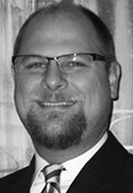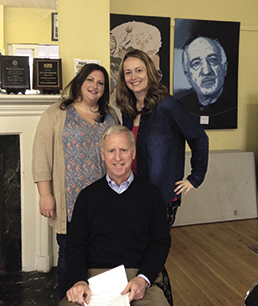Subscriber Benefit
As a subscriber you can listen to articles at work, in the car, or while you work out. Subscribe NowBy Kristopher N. Kazmierczak, Katz Korin Cunningham
 Kazmierczak
KazmierczakLindsay Faulkenberg, a veteran attorney at Kids’ Voice of Indiana, devotes approximately five hours a week to pro bono work. Her formula for a fulfilling pro bono experience is relatively simple: you have to “be willing.” She explained that lawyers are known for their charitable work and eagerness to help when called upon to do so. It’s not a lack of willingness to act in response to a request for assistance that Lindsay identified as an area of deficiency with addressing the overwhelming amount of pro bono needs in our community. Indeed, as Lindsay observed, the legal community does a super fine job of stepping up when asked to lend a hand and time. Rather, Lindsay’s focus centered on a different path to pro bono work based on her personal experiences. Her suggestion is for attorneys to seek out pro bono opportunities and be more proactive than reactive. It is in these terms that she speaks of being willing.
Lindsay offered one way to be proactive is to be willing to mark out time for pro bono work. For instance, this can be accomplished by creating a goal to set aside a few hours a month for pro bono work. Once the amount of time is established, then it makes it easier to search for pro bono opportunities that fit the allotted amount of time. Lindsay finds that by marking out the time in advance it leads to an attorney being more willing to actively pursue pro bono opportunities, rather than waiting for opportunities to present themselves or a call from a colleague.
 Lindsay Faulkenberg, top left, volunteers at the Peace Learning Center with fellow IndyBar members Tara Rabiola and Lee Christie.
Lindsay Faulkenberg, top left, volunteers at the Peace Learning Center with fellow IndyBar members Tara Rabiola and Lee Christie.The second thought is for attorneys to be willing to seek out and be open to a new challenge. Lindsay said lawyers are tempted to limit themselves to the area of their practice when undertaking pro bono services. And this is understandable as it is more comfortable to take on extra projects in an area of familiarity. Lindsay offers a different approach to consider. From Lindsay’s observations, there seem to be two common areas of legal need that remain underserved, which include family law, particularly for foreign residents, and issues requiring child advocacy that normally require the appointment of a Guardian Ad Litem. Lindsay suggests that attorneys should be willing to seek out lawyers who practice in the areas where the legal services are needed the most and to team up with these experienced lawyers to act as co-counsel.
As Lindsay explained, lawyers tend to become tracked in their practice areas and it is good for us all to break out of our cycle and to help where the need exists the most. The co-counsel approach lessens the time commitment, fosters building relationships with other lawyers, lessens any anxiety over not knowing every intricate aspect of a certain area of law, and most importantly it creates a chance for the legal need to be fulfilled. Adopting this approach might create a good opportunity to reach out to that favorite law school classmate or former partner that you haven’t seen for a while to consider working on a project together.
Lindsay said a third idea is for lawyers to be willing to actively encourage other lawyers to accept pro bono work. Lindsay further observed that being willing to be proactive by setting aside a certain amount of time to commit to pro bono work produces another beneficial by-product, in that, it motivates others to get involved. She has witnessed the effect of lawyers talking about their personal experiences as an initiative for another lawyer to be encouraged to volunteer. Encouragement might also be shown by a more seasoned lawyer who has experience in the area of the particular legal need taking the initiative to reach out to attorneys who practice in areas that are less needed for pro bono work and offer to co-counsel on a pro bono project.
As for Lindsay, her normal workload is focused on serving many children and families daily and the stressful fact and legal scenarios that come with this type of work. In addition to her usual day, Lindsay also volunteers to serve as a guardian ad litem for cases that would otherwise go unserved. She volunteers for family law cases through the Neighborhood Christian Legal Clinic and is trained as a court appointed special advocate, helping children who are abused or neglected.
Lindsay’s proactive drive to find alternative ways to use her legal education to assist those in need of legal services led to her co-founding the Coalition for Our Immigrant Neighbors, commonly known as “COIN”. COIN is a coalition of service providers working together to facilitate and coordinate community efforts to provide legal, psychological and other services for immigrants in Central Indiana. Lindsay identified that immigrant families, mostly undocumented, are in great need of legal services that are vastly underserved through traditional means. Since its inception in 2016, COIN has assisted with reaching immigrant families who have basic legal questions and needs but do not have the resources to either find or retain an attorney who might focus on this area of practice. By way of example, COIN designed, and continues education efforts, on family safety planning to manage the issues surrounding parents who are undocumented and living in the United States with children who are U.S. citizens. The objective of a family safety plan and documentation is to manage the care of children and property should a parent be detained or deported. Without this planning and education, the children of an undocumented foreign citizen will likely end up in foster care. This sort of forward thinking and planning also tends to create less legal issues that usually are the type that are handled through pro bono volunteers.
One of the many unique aspects of COIN is that it holds clinics in the areas of the city where the need is expected to exist and it provides training sessions and continuing legal education programs to attorneys. COIN’s training educates and equips attorneys who normally do not practice immigration law. Through this training objective COIN has created a network of attorneys willing to accept pro bono cases dealing with immigration law.
Lindsay’s closing remarks during my conversation with her sum up one of the most significant aspects of all the pro bono work performed by so many in our legal community and a common theme of my interviews with others in preparation for these articles. Lindsay succinctly stated, “If you are willing to find time to devote to even one case, it can change your life and certainly the life of those you choose to assist.” So as you set off to outline your personal pro bono goals for 2018 remember to “BE WILLING.”
The IndyBar Pro Bono Standing Committee sincerely appreciates the efforts of Lindsay, and so many other attorneys in the Indianapolis bar who give their time, talent and financial donations to ease the need for legal services to those of limited financial means in our community. The objective of this series is to acknowledge excellent pro bono efforts by members of the IndyBar and to inspire others. If you desire to be added to the growing list of lawyers willing to assist others on a pro bono basis, please do not hesitate to contact us.•
Kris Kazmierczak is a member of the Indianapolis Bar Association Pro Bono Committee and a shareholder of Katz Korin Cunningham, PC where he practices in the areas of business, contract and employment counseling and litigation.
Please enable JavaScript to view this content.
